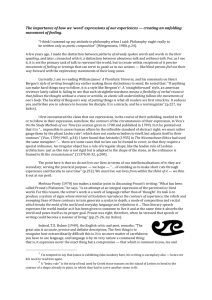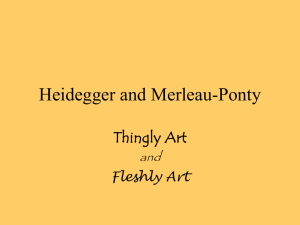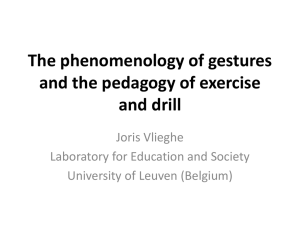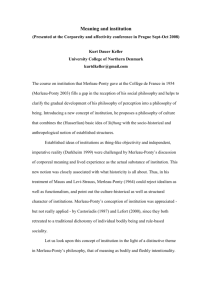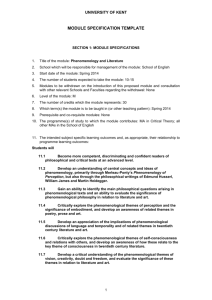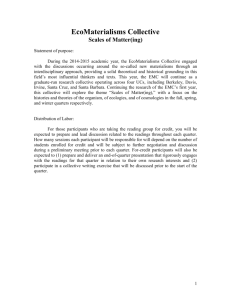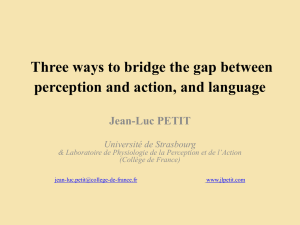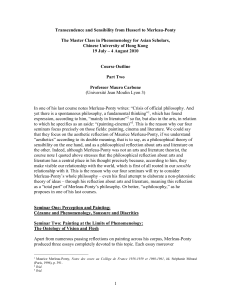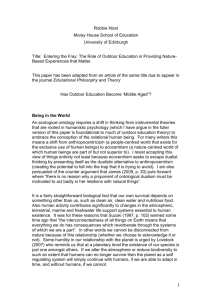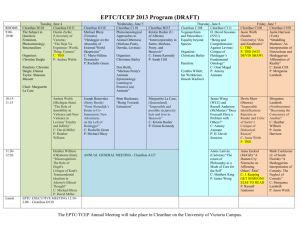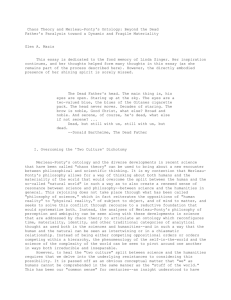Merleu-Ponty`s Philosophy of Speech
advertisement
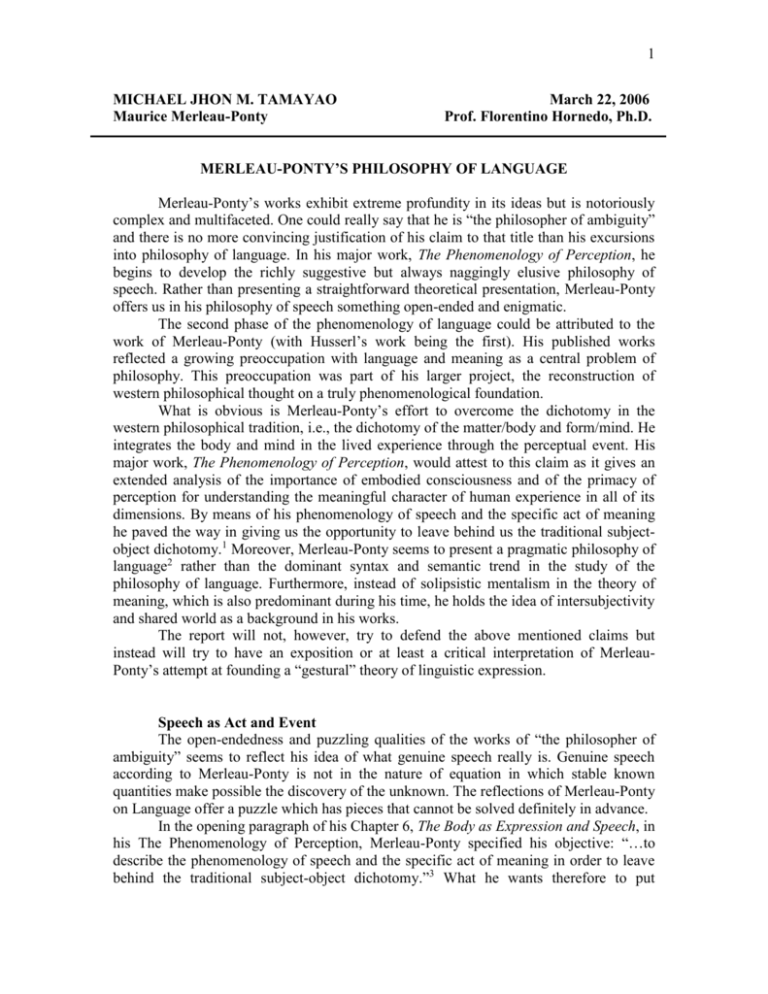
1 MICHAEL JHON M. TAMAYAO Maurice Merleau-Ponty March 22, 2006 Prof. Florentino Hornedo, Ph.D. MERLEAU-PONTY’S PHILOSOPHY OF LANGUAGE Merleau-Ponty’s works exhibit extreme profundity in its ideas but is notoriously complex and multifaceted. One could really say that he is “the philosopher of ambiguity” and there is no more convincing justification of his claim to that title than his excursions into philosophy of language. In his major work, The Phenomenology of Perception, he begins to develop the richly suggestive but always naggingly elusive philosophy of speech. Rather than presenting a straightforward theoretical presentation, Merleau-Ponty offers us in his philosophy of speech something open-ended and enigmatic. The second phase of the phenomenology of language could be attributed to the work of Merleau-Ponty (with Husserl’s work being the first). His published works reflected a growing preoccupation with language and meaning as a central problem of philosophy. This preoccupation was part of his larger project, the reconstruction of western philosophical thought on a truly phenomenological foundation. What is obvious is Merleau-Ponty’s effort to overcome the dichotomy in the western philosophical tradition, i.e., the dichotomy of the matter/body and form/mind. He integrates the body and mind in the lived experience through the perceptual event. His major work, The Phenomenology of Perception, would attest to this claim as it gives an extended analysis of the importance of embodied consciousness and of the primacy of perception for understanding the meaningful character of human experience in all of its dimensions. By means of his phenomenology of speech and the specific act of meaning he paved the way in giving us the opportunity to leave behind us the traditional subjectobject dichotomy.1 Moreover, Merleau-Ponty seems to present a pragmatic philosophy of language2 rather than the dominant syntax and semantic trend in the study of the philosophy of language. Furthermore, instead of solipsistic mentalism in the theory of meaning, which is also predominant during his time, he holds the idea of intersubjectivity and shared world as a background in his works. The report will not, however, try to defend the above mentioned claims but instead will try to have an exposition or at least a critical interpretation of MerleauPonty’s attempt at founding a “gestural” theory of linguistic expression. Speech as Act and Event The open-endedness and puzzling qualities of the works of “the philosopher of ambiguity” seems to reflect his idea of what genuine speech really is. Genuine speech according to Merleau-Ponty is not in the nature of equation in which stable known quantities make possible the discovery of the unknown. The reflections of Merleau-Ponty on Language offer a puzzle which has pieces that cannot be solved definitely in advance. In the opening paragraph of his Chapter 6, The Body as Expression and Speech, in his The Phenomenology of Perception, Merleau-Ponty specified his objective: “…to describe the phenomenology of speech and the specific act of meaning in order to leave behind the traditional subject-object dichotomy.”3 What he wants therefore to put 2 emphasis is on the speech “as a phenomenon” and meaning “as an act.” It is from this starting point that Merleau-Ponty wanted to push forward the phenomenological point of view of a “speaking subject who makes use of his language as a means of communicating with the living community.” There is a return therefore to the phenomenon of speech as lived and as originating event. Critique on Empiricism and Intellectualism In The Phenomenology of Perception, Merleau-Ponty identifies his opponents more simply as two great and mutually hostile camps of empiricists and intellectualists.4 For the empiricists, (PP, pp. 174-5) speech is not a genuine action. It is just a depersonalized phenomenon which consists of traces left (in the mind) by words heard or read. The words do not bear meaning, it functions as a psychological or physical lever. For the intellectualists (PP, pp. 175-6), words are merely external signs for what is of real importance, the intellectual operation. Again, meaning lies not in and with the word but “behind” the word, in the thought. Though seemingly irreconcilable, both the empiricists and intellectualists share the same assumption that “the word has no significance.” In Empiricism there is nobody to speak; in intellectualism there is certainly a subject, but a thinking one, not a speaking one.5 Merleau-Ponty refuted both by positing that “the word has a meaning.” His refutation is not really in the form of an argument but more of a description and recollection, lucidly done, of the actual facts on act of speaking. He has not presented a new or an unusual explanation but has rather made an exhortation to remember to pay attention to something very familiar—what it is like to express ourselves verbally. Thought seeks out to be verbalized and it is only through this crystallization into speech that we can possibly lay hold of thought. Merleau-Ponty wants to posit the indivisibility of the movement of the “meant” into the “said.”6 Speech cannot presuppose thought precisely because it is speech that actualizes and accomplishes thought. Words have meaning. In our actual denomination of objects, we do not have in mind a concept under which we would subsume them; instead, the names themselves bear the meaning and we are aware of reaching the objects in imposing their names. So we take up someone else’s thought “in” and “through” his speech. Conversation is not a mutual action at a distance of two self-enclosed subjects operating through a medium distinct from both but “making the other speak, think, and become what he never could have been by himself.”7 Originary Language How do we articulate, speak of, write, or bring into presence for ourselves or for another something that has never been articulated before? How do we express the as-yetto-be expressed? According to Merleau-Ponty, it is through the originary language. Language, as Merleau-Ponty thinks of it, is unquestionably “an originating realm,” a dimension of the meaning-forming process in which new configurations of meaning can be brought into being.8 In discussing language, he distinguished between the “authentic” use of language, where original meaning-formation takes place, and a use of language involving “ready-made formations.” Originary language is the “authentic speech,” “the first-hand speech.”9 Merleau-Ponty differentiates this type of language from “second-order expression” which is for him inauthentic “speech about speech.”10 3 The all important former category (also referred to as “literary”, “productive”, “operative”, or “creative” speech) finds its most dramatic instances in the speech of the child, the lover, the poet or philosopher. According to The phenomenology of Perception: Anterior to conventional means of expression, which reveal my thoughts to others only because already, for both myself and them, meanings are provided for each sign, and which in this sense does not give rise to communication at all, we must recognize a primary process of signification, in which the thing expressed does not exist apart from the expression, and in which the signs themselves induce their significance externally. 11 It is only in the operative, creative or authentic speech that there is no real separation of thought and language. This is because authentic speech is the presence of thought in the world- not as garment but its body. Thought and meaning is in the speech so a listener can learn and grasp what the speaker says. Just as the singer brings into significance the being of a song so is a speaker bringing into significance the being of his thought. However, authentic language is not dialectically opposed to inauthentic linguistic expressions, but they are rather dependent to one another. What is at one point authentic speech that formulates for the first time will become sedimented into habituated, secondorder language.12 Second-order language, on the other hand, provides the foundation for new and creative forms of linguistic expressions. Originary language, therefore, also emerges from second-order language. Furthermore, all types of expressions are rooted in the cognitive-linguistic structures that belong to the “body-subject.”13 The originary language is a bodily language. “Anything that may be thought must be ‘speakable’.”14 It says something by secreting its own meaning, it is a gesture, an action, it has an emotional content, it is existential, its meaning inhabits the world, and it is contingent.15 It is the body that points out and speaks. Speech as Gesture The subtitle suggests the apparent antipathy of Merleau-Ponty to the conception of the speaking subject as a disembodied consciousness. For him, the human speaker is a body. Speaking is a bodily activity which is analogous to other uses of body in certain fundamental ways. The body in general is the best analogue for the speaking body.16 In Merleau-Ponty’s “The Child’s Relations with Others,” he again presented speech in the context of action, as it is used, and as it is acquired. The acquisition of language takes place not by an intellectual operation, but by a sort of “habituation”, a use of language as tool or instrument.17 A language learned is in relation to our power to speak, as limbs are to the power to move. Speech therefore is a spontaneous act of the body and not the dominant idea of the thought/language parallelism. In order to see how the act of speaking is able to capture and convey a sense of meaning we must first look to the power of speech as a power of gesture. Gesture is understood here in its broadest sense which includes physical movements, signals and even pantomimes which are essentially “communicative.” Gesture’s meanings are not cognitively understood or intellectually deciphered. Rather, the gestures I witness “outlines an intentional object,” brings “certain perceptible bits of the world to my notice inviting my concurrence.”18 The meaning of the gesture is not alongside or behind it, but “intermingled with the structure of the world outlined by the gesture.”19 The meaning of 4 the gesture could be grasped in the reciprocity of embodied beings. In seizing the meaning of a gesture it is “as if the other person’s intention inhabited my body and mine his.”20 There is a sort of synchronization of one’s existence with the other which in effect draws one into the other’s world and the other’s into him. So behind the possibility of our “deliberate” collaborations is our unconstructed intuitive capacity for “reading” and “following” other’s mute behavior.21 In The Phenomenology of Perception, Merleau-Ponty emphatically declares that “the spoken word is a genuine gesture and it contains its meaning in the same way as the gesture contains its.”22 Like the gesture, the word bears within itself its meaning; a meaning which is not of a disembodied subject. Like gesture, speech is the subject’s taking up of a position in the world and brings about, for both the speakers and hearers a structural co-ordination of experience.23 Furthermore, language discloses not only to the listeners, but to the speaker as well. The harnessing of a signification in language endows both the listener and the speaker with “a new sense organ,”24 and opens for both new fields of experience. Thus, “my spoken words surprise me myself and teach me my thought.”25 Language expresses one’s ways of being-in-the-world. Going beyond the conceptual connotation of the meaning of a word, one will discover the gestural meaning of the words which possesses immanent significance. Different languages, having its own nuances, have their own respective ways of expressing their ways of being-in-the-world. Speech as Figure on a Ground There are problems posited by Merleau-Ponty himself on the above mentioned description of the relationship of linguistic gestures and its meaning. By tackling his own posited problems, he was able to further develop his theory of speech as a gesture. The problems he asked are: (1) what is the common ground in terms of which speech can be understood?, (2) whether the relation between word and meaning is not merely conventional. Merleau-Ponty answered the first by offering the established cultural background of already constituted and hence publicly available meanings and structures of language as solution.26 The linguistic convention is the shared backcloth for the linguistic gesture. As was seen before, authentic or creative speech is founded upon and requires the established linguistic system as its necessary condition. Speech as a figure on the ground of silence speaks to problem (2). Merleau-Ponty dealt with the insistent problem of the origin of language in here. Given the idea that authentic speech is founded in the already established system of signification, the next problem to be dealt with is how did this established structure come to be constituted? We must find “beneath the chatter of words, the primordial silence… and describe the action which breaks the silence.”27 According to Merleau-Ponty, as long as we are mesmerized by the chatter, the second-order expression, the “speech about speech,” the “meanings” we are bound to think of are sedimented, conceptual meanings of the lexicon or dictionary. The relation of word and meaning in this order is only external and conventional. Merleau-Ponty suggests that conceptual meanings and all the structures of a particular language have a history; and histories have beginnings. These beginnings lie in the “primary processes of signification” which is seen in the spontaneous eloquence of 5 the living body as the non-conventional ground of the development of conventional meanings. The “action which breaks the silence” is, originally, the mute but spontaneously expressive comportment of the living body to signify. 28 Out of this capacity grows a conventionalized system which is a language. However, the significance of mute gestures is neither arbitrary nor conventional. Silence The theme of silence is perhaps the most arresting feature of Merleau-Ponty’s philosophy of speech. In “The Body as Expression, and Speech,” Merleau-Ponty wants to address the problems of (1) how can language start? And (2) how can language grow? His single answer is the theory of speech as gesture. But this answer of his remained incomplete before the notion of silence is further articulated. Silence for Merleau-Ponty is not just the prehistory of speech but is the empty which awaits saturation. This silence is “alive” so to say. It is an absence whose presence weighs almost tangibly upon us who speak, which at once generates, propels and magnetizes discourse.29 Signification arouses speech as the world arouses our body, by a mute presence which awakens our intentions without deploying itself before them.30 It is signification or meaning itself. Merleau-Ponty refers to silence in many ways: as “speech before it is spoken,” a “mute presence,” “lack asking to be made good,” “a determinate gap.” Though silence is a gap, something felt to be missing, it is a determinate emptiness, its boundaries described by all that is already expressed or said. Silence, then, is the lurking signification that has not found its voice; it is an “idea.” This idea is not arrived at but some sort of static or contemplative mental state or a finished performance; it is a power to organize discourse in a coherent way.31 Silence, therefore, is always incomplete. So in authentic speech, there is an inauguration of a continuing dialogue rather than an accomplishment. Without the background of silence which surrounds speech, it would “say nothing.” There is always silence not only antecedent to language but behind the already formed calculus of language, beneath the usual chatter, between the words of the lexicon and all the structures of language; there is always the yet-unmeant, yet-unthought and the yet-unsaid. The “insistent problem” of the origin of language is no matter of discovering some obscure historical fact, but it is the immense and ponderous task of understanding this one particular case of our always present and open-ended possibility of creating new meanings and conveying them, which Merleau-Ponty calls an “irrational power.”32 Although language wants to lay claim of the things themselves, the effort still remains idealistic. Speech surges out toward what it signifies, toward reality. But in understanding reality what we grasp are meanings, and meanings are never entirely extricable from the intercourse of signs. And for this, Merleau-Ponty states that language is uncommunicative of anything other than itself.33 Conclusion Marleau-Ponty’s Phenomenology of Language was used as an apology for Husserl’s “Crisis of European Thought.” It was basically a response against the rampant way of thinking during their time which was characterized as a reductive way of making 6 humans as mere external forces. Humans were merely seen as response-based agents who do not have any personhood. Merleau-Ponty’s study of language acquisition of the children for example presented counter paradigmatic claims against the kind of thought Europe has then. For him, though external forces were received by children, they converted it in ways that were sensible to them, even very surprising for adults. The point Merleau-Ponty wanted to drive at was that there was something original in each and every one of us. Language was a proof of our personhood though at times contested. ENDNOTES 1 Merleau-Ponty, Phenomenology of Perception, trans by Colin Smith (New Jersey: The Humanities Press, 1962) p. 174. henceforth, PP. 2 The orientation toward speech as an individual act or performance in a concrete text, and toward the speaker-audience relation. See Margareta Urban Coyne, “Merleau-Ponty on Language: an interrupted journey toward a phenomenology of speaking,” International Philosophical Quarterly 20/3 (1980), p. 308. Henceforth, Coyne. 3 PP, p. 174. 4 Cf. PP, pp. 174-176. 5 Ibid., p. 177. 6 The usual theoretical accounts holds the dichotomy between the mind and the expressed words. There is only the sequential processes—meaning/expression, thinking/saying, stimulus/response, etc. See Coyne, p. 311. 7 Merleau-Ponty, “Introduction to that Collection” included in the Primacy of Perception, ed. James M. Edie (Evanston: Northwestern University Press, 1964), p. 19. 8 Ibid. 9 Cf. Ibid., p. 178-179. 10 Ibid. p. 178. See also Samuel Mallin, “Merleau-Ponty’s Philosophy” (London: Yale University Press, 1979), p. 183. henceforth, Mallin. 11 PP, p. 166. 12 Cf. Ibid. 13 Mallin., p. 183. 14 PP., p. 183. 15 Cf. Ibid., pp. 184-193. 16 Coyne, p. 313. 17 Merleau-Ponty, “The Child’s Relations with Others” included in the Primacy of Perception, ed. James M. Edie (Evanston: Northwestern University Press, 1964), p. 99. 18 PP, p. 186. 19 Ibid. 20 Ibid., p. 185. 21 Coyne, p. 315. 22 PP, p. 183. 23 Ibid., p. 193. 24 Ibid., p. 182. 25 Merleau-Ponty, “On the Phenomenology of Language,” included in Signs, trans Richard C. McClearly (Evanston, III, Norwestern University Press, 1964), p. 87. Henceforth, PL. 26 Coyne, p. 318. 27 PP, p. 184. 28 Coyne, p. 319. 29 Ibid., p. 320. 30 PL, p. 89. 31 Coyne, p. 320. 32 PP, p. 189. 33 PP, p. 188.
